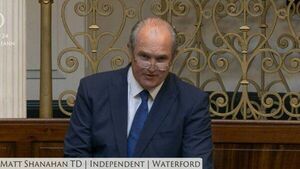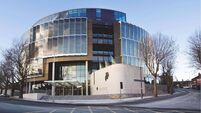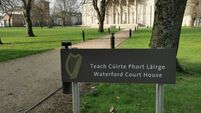Could Apple windfall land in the south east?

Deputy Matt Shanahan
Apple must pay Ireland a €13.1 billion tax bill, following a landmark ruling by the Court of Justice of the European Union.
With interest on that sum, the Government are due to receive a sum in the region of €14 billion. With Government officials starting to drop hints as to how they want to carve up the Apple billions, could some of the money be spent in the south east?
That’s what Deputy Matt Shanahan has called for: “We need to be looking at strategic areas as to how we are going to future-proof our economy, and we need investment in our third-level education, particularly in the southeast, where we have had none.”
“I would be saying to the Government that investment should be ring-fenced, solely and purely for quantifiable structural capital and economic development in the country and nothing else. It should not find its way into the Budget,” he said.
“We need proper costed investment, not more bike shelters."
Speaking to the Waterford News & Star, Deputy Shanahan warned that the case could lead to a drop in foreign investment into the country. He believes that the changes indicate that the “tax regime is changing for companies [in Ireland] who are basically offshoring intellectual property rights in this country and using us as a tax haven.”
“That's going to make a significant impact and I can guarantee you that Donald Trump will at some point reference this money and describe Ireland as he has before, as a tax haven for American companies, and that he wants to onshore back to America all those taxes," he said.
Deputy Shanahan called for the money to be invested into the future of the country: “This is an absolutely exceptional amount of money It should be targeted solely and only at capital development and infrastructural development because that's what we need to secure the country into the future in terms of our economic position.”
He recommended the money be invested into renewable energy across the south east as to support the construction of offshore wind farms as well as using the money to help farmers.
“We have to help farmers in terms of farming output, we are killing the farm sector at the moment with regulation and with green and organic requirements," he said. The TD likened the Apple tax bill to a family inheritance: “This is a windfall, like an inheritance that somebody gets. You cannot bring it into your current account, and you cannot spend it as if it's money that you're going to have next year, you'll never have it again.”
Similarly, Gerald Hurley, CEO of Waterford Chamber, warned against including the lumpsum tax bill in the upcoming budget due to the risk of inflationary pressures.
Instead, he called for the money to be spent in the South East: "If the government is considering large-scale infrastructure investments, we would strongly advocate for a portion of these funds to be allocated to the South East and Waterford. This would not only boost the region’s economic potential but also help address the fact that, over the past decade, public capital spending in the South East has been less than one-third of its proportionate share.”
Mr Hurley highlighted the need for investment into South East Technological University (SETU) to fund its five-year €350m capital programme as well as infrastructural improvements across the South East. The Waterford Chamber called for the tax bill to be invested into Waterford Airport and surrounding transport links. By investing the windfall into capital infrastructure projects, the Waterford Chamber hope the investment would “provide long-lasting, tangible benefits to the South East, ensuring that the Apple windfall supports balanced national development.”






